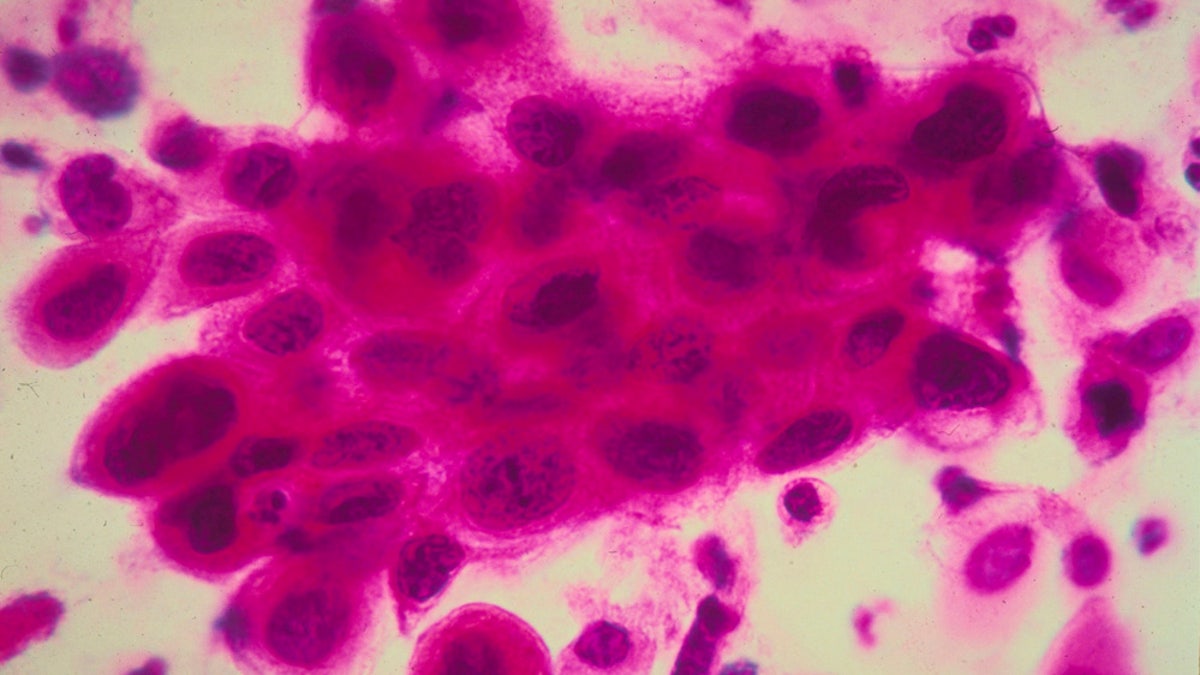
Close up of cancer cells in the cervix. Cancer of the uterine cervix, the portion of the uterus that is attached to the top of the vagina. (Photo by American Cancer Society/Getty Images)
The human papilloma virus (HPV) is the most common sexually transmitted virus in the U.S., affecting more than 70 percent of sexually active adults at some point in their lives. Currently there is no effective treatment for HPV, but researchers from the University of Texas Health Science Center at Houston Medical School said they may have uncovered a way to eliminate the virus— and they have found it in mushrooms.
In the study, 10 HPV-positive women were treated orally with the Japanese mushroom extract active hexose correlated compound (AHCC) once daily for six months. Five achieved a negative HPV test result— three with confirmed eradication after stopping AHCC. The remaining two responders are continuing to participate in the ongoing study.
The research was presented at the Society for Integrative Oncology International Conference in Houston this week by Dr. Judith A. Smith, associate professor in the department of obstetrics, gynecology and reproductive sciences at UTHealth Medical School.
“I had originally looked into AHCC for its anti-tumor benefits,” Smith said of the decade-long research process. “Then as I learned more about its activity against various virus strains, I connected the dots to my cervical cancer research and HPV and thought of the big picture: a nutritional supplement to treat HPV infections would be an incredible, safe option and could easily be used to treat infections before they turn into cancer.”
HPV is associated with more than 99 percent of cervical cancers, and according to the Centers for Disease Control and Prevention (CDC) it is also linked to several other types of the disease including cervical, vulvar, vaginal, penile, anal, and throat cancer.
AHCC is a readily available nutritional supplement that uses the body's own immune system to help fight disease. Human and preclinical studies have shown that AHCC increases the number and activity of Natural Killer cells, dendritic cells and cytokines, which help the body fight off infections and block tumor growth. The extract showed no negative side effects in the trial.
Smith said AHCC, found in the basidiomycetes mushroom, was chosen in the study over other extracts found in different types of mushrooms because it has an isolated acetylated alpha glucan component, whereas most other mushroom extracts don’t.
Although the study focused only on women, Smith told FoxNews.com that she believes AHCC will have the same result on men because their immune systems are the same, and the same strains of HPV affect both sexes. The extract may also have the potential to treat genital warts in men, Smith noted.
“While I have not done a pilot study in men, I have had quite a few that have emailed me based on our preclinical data to inquire if it would help clear genital warts,” she said. “I did provide them with the AHCC dosing we are using— of course with all the disclaimers for health care and clearly stated we did not study the HPV strains related to genital warts. I had heard back with a few that have reported lesions disappeared and none recurred.”
Further investigation in a formal phase II randomized placebo-controlled study is now being enrolled at The University of Texas Health Science Center at Houston Medical School.
“When I started, I was just looking at preventing cervical cancer, but 10 years later the potential is beyond just cervical cancer to other cancers like head and neck cancers, anal cancers, and penile cancers. I am very excited about the potential,” Smith said.
